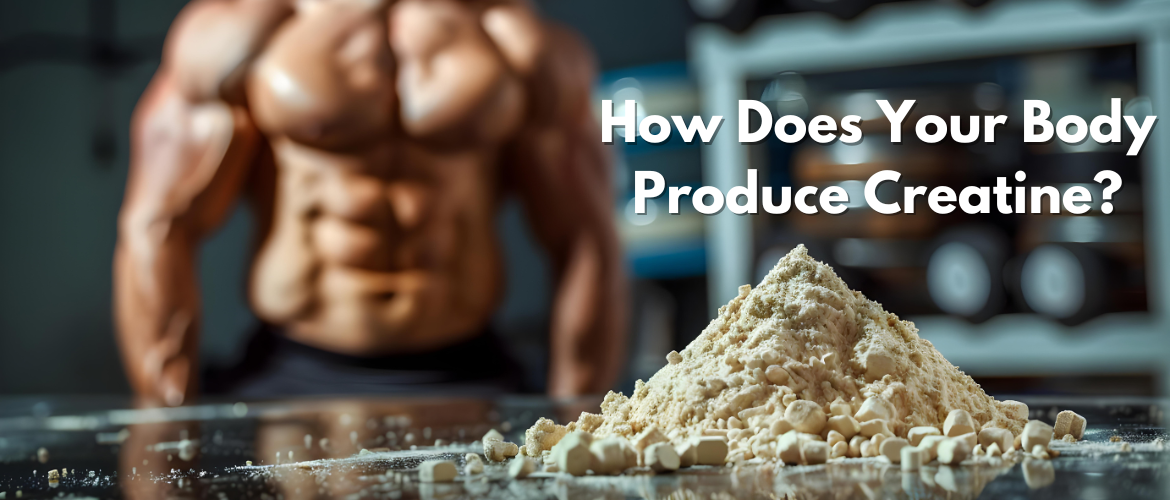No products in the cart.
How Does Your Body Produce Creatine?

Pure creatine is a compound that has become synonymous with enhanced physical performance, improved muscle recovery, and better energy levels. While supplements like pure creatine powder are widely used to boost these benefits, have you ever wondered how your body produces creatine naturally?
In this in-depth guide, we’ll explore the fascinating science behind pure creatine production, the organs and processes involved, and how diet and lifestyle choices can impact your creatine levels. Whether you’re an athlete seeking to optimize your performance or someone curious about the biology of this essential compound, this article has everything you need to know.
What Is Creatine, and Why Is It Important?
Before diving into how the body produces creatine, let’s understand what creatine is and why it plays such a vital role in overall health.
Creatine is a naturally occurring organic compound primarily stored in the muscles. Its primary function is to provide energy for high-intensity, short-duration activities such as sprinting and weightlifting. It achieves this by replenishing ATP (adenosine triphosphate), the energy currency of the body.
While supplements like pure creatine monohydrate are popular, your body is fully capable of synthesizing its own creatine supply, given the right conditions.
How Does the Body Produce Creatine?
Your body produces pure creatine through a biochemical process involving three key amino acids: glycine, arginine, and methionine. These amino acids work together to synthesize creatine, which is then stored in your muscles for energy use.
Step-by-Step Creatine Production
- Liver, Kidneys, and Pancreas Take the Lead
Creatine synthesis primarily takes place in the liver, kidneys, and, to a lesser extent, the pancreas. These organs combine glycine and arginine to form guanidinoacetate, an intermediary compound in the production of creatine. - Methylation Process
Next, guanidinoacetate undergoes methylation with the help of methionine to produce creatine. This transformation is crucial for generating the pure creatine that fuels your muscles. - Storage in Muscles
Once synthesized, around 95% of creatine is stored in skeletal muscles, while the remaining 5% resides in the brain, heart, and other organs. This stored creatine is readily available to regenerate ATP during physical activity.
Diet and Its Role in Creatine Production
While your body can produce its own pure creatine, diet plays a significant role in maintaining adequate levels. Foods rich in creatine and the amino acids required for its synthesis can enhance your body’s natural production.
Foods That Boost Natural Creatine Levels
- Red Meat and Fish
Animal-based sources like beef, salmon, and tuna are excellent natural sources of creatine. These foods contain preformed creatine, helping the body maintain its reserves. - Plant-Based Protein Sources
While creatine is more abundant in animal products, vegetarians and vegans can focus on foods rich in glycine, arginine, and methionine, such as nuts, seeds, and legumes, to support pure creatine synthesis. - Dietary Supplements
For individuals who struggle to maintain sufficient levels naturally, supplements like pure creatine monohydrate powder can be a convenient and effective solution.
Factors That Influence Creatine Production
Your body’s ability to produce pure creatine can vary based on several factors:
- Age
As you age, your natural creatine production may decline, reducing your overall muscle energy. - Physical Activity
Active individuals deplete their creatine stores faster, requiring both efficient natural production and supplementation. - Dietary Choices
Low intake of amino acid-rich foods can limit your body’s ability to synthesize adequate levels of pure creatine.
The Benefits of Maintaining Optimal Creatine Levels
Whether obtained through natural production or supplementation, maintaining healthy creatine levels comes with several benefits:
- Improved Muscle Performance
Pure creatine enhances ATP regeneration, allowing you to perform better during high-intensity workouts. - Faster Recovery
Creatine helps reduce muscle fatigue and soreness, promoting quicker recovery between training sessions. - Cognitive Support
Beyond physical performance, creatine is essential for brain health. It supports mental clarity and reduces cognitive fatigue. - Long-Term Health
Adequate creatine levels may help prevent age-related muscle loss and improve overall metabolic health.
Should You Supplement with Creatine?
While your body is capable of producing pure creatine, supplementation is often recommended for individuals with high physical demands or dietary restrictions. Vegans, vegetarians, and athletes, in particular, can benefit from adding pure creatine monohydrate powder to their daily routine.
Final Thoughts
Understanding how your body produces pure creatine is a fascinating insight into its ability to fuel your physical and mental performance. While natural creatine production is sufficient for basic functions, supplementation can provide an added boost for athletes, gym-goers, and anyone looking to optimize their energy levels.
By incorporating creatine-rich foods and, when needed, high-quality pure creatine supplements, you can take full advantage of this powerful energy booster to enhance your performance and overall health.
Start your wellness journey today — Visit Unike Nutra Now
Follow us
Facebook – https://www.facebook.com/profile.php?id=61567462823245
Instagram – https://www.instagram.com/unikenutra/
Twitter – https://x.com/Unikenutra
Amazon: https://www.amazon.com/stores/UnikeNutra/
Buy Now:






